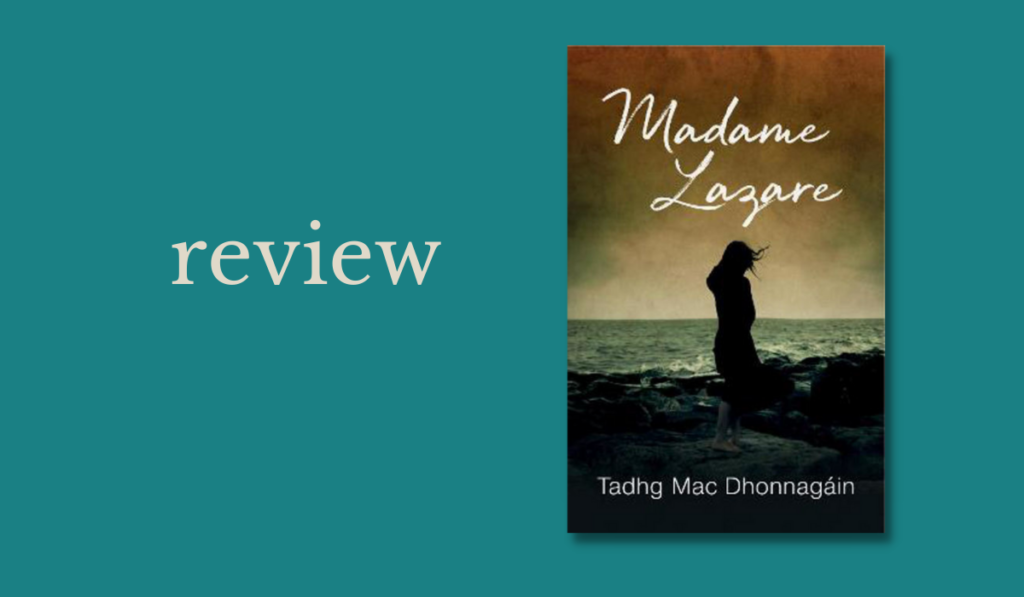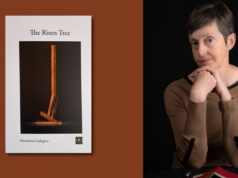
Madame Lazare|Tadhg Mac Dhonnagáin|pb; 255p| €15.95| Barzaz|ISBN 978-1-910945-74-2
As the first book from a new imprint it’s impossible to resist the proverb ‘Tús maith, leath na hoibre‘—Cathal Póirtéir on Madame Lazare, by Tadhg Mac Dhonnagáin (Barzaz).
Tadhg Mac Dhonnagáin is a writer, publisher and television scriptwriter as well as a popular singer-songwriter. His last venture as a writer was the prize-winning Mise Raiftearaí, an Fíodóir Focal, his sympathetic re-imagining of the life and times of Mayo poet Antaine Ó Raiftearaí.
Madame Lazare
Mac Dhonnagáin’s latest book is his first novel, Madame Lazare, a tale of mystery which shifts in time and place between Árainn, Paris and Brussels from the mid-twentieth century to the present day. Personal, family and cultural identity become uncertain as events unfold and attempts to hide past histories eventually fail.
The emerging truth challenges who people are, where they come from, what they have done and why things have turned out the way they have.
The two main characters are Levana and her grandmother Hana Lazare who, as a young Jewish refugee, had to flee her home in Estonia to avoid religious persecution and the threat of death at the hands of the Nazis.
Of all her family, only Hana, the Madame Lazare of the title, survived the genocide and forged a new life for herself, far from home, friends or family. Unsurprisingly, perhaps, she was always reluctant to talk about that traumatic period of her life and avoided contact with fellow Jewish survivors from her native Estonia.
A hidden past
When Hana begins to suffer from dementia in old age her grand-daughter is firstly puzzled and then increasingly troubled by some of the unusual and uncharacteristic things Hana is saying. Levana decides to investigate those disquieting statements which cast doubt on all that she knows about her grandmother and her past life. We follow her as she begins to unearth a deliberately hidden past, collusion in a false identity, and a distant tragedy which dictated the course of events that followed.
Non-linear mystery
The author switches time, place and focus in a non-linear narrative, beginning in a boat in Galway Bay in 1944,then switching to and from Brussels in 2015, Paris in 1995, London during the blitz and Árainn in the 1930s and 40s. Events are brought to a conclusion with Levana on the island in 2018, by which time she has discovered the truth of Madame Lazare’s past and the reasons for her hidden life.
While the reader is made aware of some of the details of the true story at various stages of the narrative, the dots have to be joined bit by bit as the story brings us through various locations and time periods. The author manages to hold back enough essential information to keep us involved in Levana’s investigation from start to finish.
As in all the best mystery stories we are gradually fed apparently unconnected elements of information and envouraged to imagine the links that might bring them all together.
While calling it a page-turner might imply a quicker pace of revelation that Mac Dhonnagáin employs, the gradually unfolding narrative keeps enough in reserve to bring the story to a successful and satisfactory conclusion.
Shortlisted
We are variously introduced to local detail on Jewish customs, the Irish Folklore Commission’s Schools Collection, life on Árainn during World War Two and contemporary Paris and Brussels. An Irish translator in the European Parliament plays a central role in making sense of the strange words Levana records from her confused grandmother and provides the key to unlock the mystery that has emerged from the old woman’s past.
Madame Lazare has been shortlisted for Gradam Uí Shúilleabháin, the Irish Language Book of the Year Award, which Tadhg Mac Dhonnagáin has previously won as writer and publisher of Mise Raiftearaí, an Fíodóir Focal (Futa Fata).
This is an enjoyable, well-written and engaging novel that takes us on an international journey; it blends individual and European history to good effect while raising interesting questions about personal and cultural identity.
As the first book from a new imprint it’s impossible to resist the proverb ‘Tús maith, leath na hoibre’.

Cathal Póirtéir has specialised in researching, presenting and commissioning Irish interest material in various radio formats and in books, including history, literature and folklore in Irish and English, as well as current affairs and drama.












